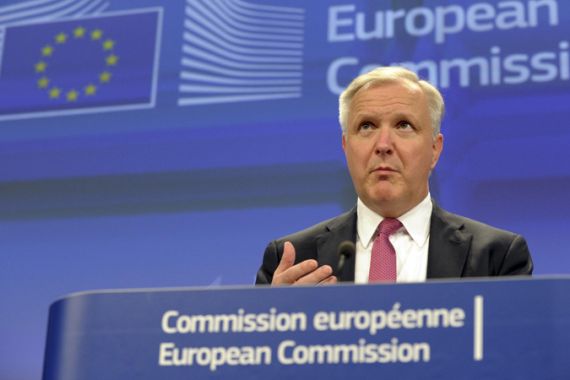Latvia gets approval to join eurozone
The European Commission says Latvia’s economic management was commendable, and it is ready to have the Euro in 2014.

Latvia has won a resounding vote of approval from the EU executive to join the 17-nation eurozone as early as January after bringing its economy out of a dire recession in 2008-2009.
The European Commission said in a report commending Riga’s economic management that “Latvia is ready to adopt the euro in 2014.”
Keep reading
list of 4 itemsWhy are nations racing to buy weapons?
Parallel economy: How Russia is defying the West’s boycott
US House approves aid package worth billions for Ukraine, Israel
Wednesday’s report is to be handed to the European Parliament for approval with finance ministers from the nations sharing the single currency to formally hand down a decision July 9 on Latvia becoming the 18th member of the euro area.
Shrugging aside strong popular opposition to the move, Prime Minister Valdis Dombrovskis welcomed the news, saying in Riga that “joining the euro will benefit Latvia’s economy by removing currency conversion costs and raising Latvia’s credit rating.”
“Latvia is a small, open economy,” he added. “We think euro membership will increase investment activity. We need only to look at the Estonian example where investment in the non-financial sector doubled.”
The most recent opinion poll, a May survey from TNS, said only 36 percent of Latvians favoured switching from the lats to the euro, with 62 percent against, though this was far less than a few months ago.
The Brussels report said Riga satisfied the economic conditions to join, in terms of price stability and sound public finances, and that its national legislation was compatible with the rules of Economic and Monetary Union (EMU).
But it also lavished praise on the government for its handling of its handling of the 2008-2009 crisis.
“Latvia’s experience shows that a country can successfully overcome macroeconomic imbalances, however severe, and emerge stronger,” said the EU Commissioner for Economic Affairs Olli Rehn.
‘Sign of confidence’
Saying Latvia was forecast to be the fastest-growing EU economy this year, Rehn said its willingness to switch from the lats to the euro “is a sign of confidence in our common currency and further evidence that those who predicted the disintegration of the euro area were wrong.”
But even as Riga awaited the report, protests continued.
“The fact is this; the people don’t want the euro. Parliament should listen to the people’s wishes,” Girts Mazurs, who launched a petition that has gathered more than 10,000 signatures, told a parliamentary committee.
The Latvian premier said however that evidence has shown that once the currency is adopted “public support will rise.”
“For three years all people have heard are stories about a crisis in the eurozone,” he said. “There is no euro crisis, there are crises in some parts of the eurozone.”
The Commission report said that with average inflation over the 12 months to April 2013 at 1.3 percent this was well below the reference value of 2.7 percent.
But it warned that “Latvia will need to remain vigilant to keep inflation at a low level, including by maintaining a prudent fiscal policy and keeping domestic demand on a sustainable path.”
It also commended Riga for bringing its government deficit-to-GDP ratio from 8.1 percent in 2010 to 1.2 percent in 2012.